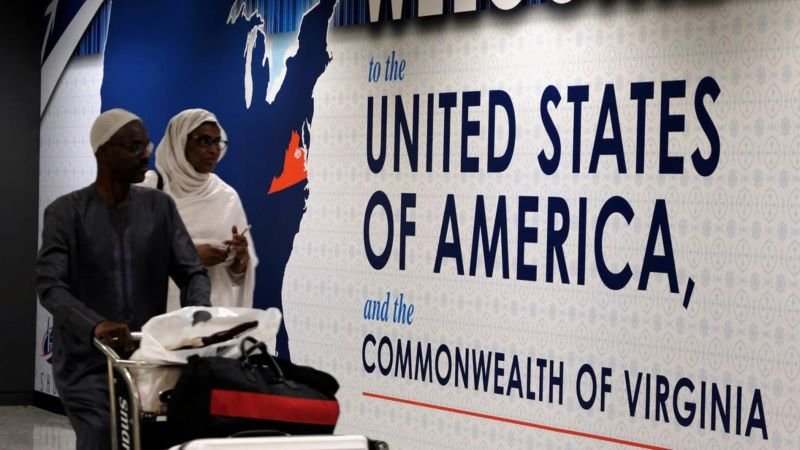IN a major change that will affect thousands of Nigerian travelers, the United States Department of State has announced a new non-immigrant visa policy that drastically reduces the validity and flexibility of most US visas issued to Nigerian citizens.
News Point Nigeria gathered that effective July 8, 2025, nearly all non-diplomatic, non-immigrant visas issued to Nigerians will now be valid for only three months and permit only a single entry into the United States, according to a statement released by the US Embassy in Abuja on Tuesday.
While the changes are already in effect, the embassy clarified that Nigerian citizens who already possess US visas issued before July 8 will not be affected. Those visas will retain their previously stated validity periods and entry allowances.
“Visas issued before July 8, 2025, remain valid as stated on the visa,” the embassy confirmed.
The embassy explained that the decision was based on a “global visa reciprocity” review, a routine process used by the US State Department to align visa policies with those of foreign governments and to enforce technical, security, and policy standards.
“This is part of the Department’s global visa reciprocity process. It is a continuous process and is subject to review and change at any time,” the statement noted, adding that such changes can include “increasing or decreasing permitted entries and duration of validity.”
The US said the goal is to maintain the integrity of its immigration system, ensure fair bilateral visa practices, and minimize abuse of visa privileges, particularly through overstays and inadequate identity verification.
To justify the policy shift, the US listed several criteria that countries must meet to maintain or improve visa terms with the United States. These include:
Secure Travel Documents: Nations must issue tamper-proof passports with verified identity features.
Visa Overstay Management: Countries must enforce laws and technology to track travelers and reduce overstays.
Information Sharing: Nations must be able to share relevant data with US authorities, including criminal and security records, to ensure public safety.
“US visa criteria and standards are designed to protect the integrity of US immigration systems,” the statement emphasized.
Despite the stricter regulations, the US embassy emphasized that the decision was not punitive but technical and policy-driven, and that it continues to work with Nigerian officials to bridge gaps in compliance with international standards.
“The US Mission is working with the Government of Nigeria to ensure that Nigeria can meet the criteria,” the embassy said.
The mission further commended Nigeria’s immigration and security agencies for their reform efforts and signaled ongoing diplomatic cooperation.
The embassy used the opportunity to advise Nigerian travelers to respect the conditions of their visas, including timely departure and accurate documentation.
“Nigerian travelers are encouraged to respect and adhere to the terms of their visas, and ensure travel documents are authentic, accurate, and up to date,” the statement said.
Though the announcement has sparked concern among prospective travelers and the education, business, and tourism sectors, the embassy reaffirmed that Nigeria remains a strategic partner to the United States.
“The United States values its longstanding relationship with Nigeria and remains committed to expanding our partnership based on mutual respect, shared security priorities, and economic opportunity,” the embassy said.
It also stressed continued engagement with Nigerian citizens through people-to-people exchanges, including education, business, and cultural programs.
“We look forward to continued cooperation at all levels with the Nigerian public and government officials to ensure safe and lawful travel between the United States and all countries,” the mission concluded.
This latest update will affect a wide range of Nigerian applicants from tourists and short-term visitors to students seeking visa renewal under F, M, or B categories by limiting them to only one US visit within a 90-day period per visa issuance.
Travel agencies, education consultants, and international business professionals have already begun advising clients to reassess travel plans, given the implications for reentry and duration of stay.







